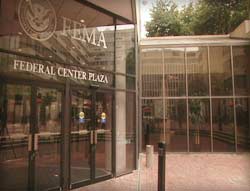
FEMA Headquarters 1960s - 1970sA series of major natural disasters hit the United States during these decades. Over 100 different federal agencies are collectively involved in the relief efforts and people often complain about the lack of coordination and poor results. There is growing recognition of the need for a centralized emergency management system. 1979Pressed by state governors, President Jimmy Carter creates the Federal Emergency Management Agency (FEMA). 1980sDuring this decade, FEMA is not really tested by a major disaster and under Presidents Reagan and Bush, it endures scandal and becomes known as a sort of backwater and a parking lot for political appointees. 1992 - Hurricane AndrewThis Category 5 hurricane -- the first in 23 years -- strikes southern Florida south of Miami. Thousands are stranded without food and water. Overwhelmed local emergency managers wait and wait for FEMA. It takes five days for federal troops to arrive. 1993Recognizing the political value in reforming FEMA, the new Clinton administration appoints James Lee Witt director. He is the first in the agency's history with direct experience in emergency management. 1993- 2000During Witt's tenure, both Democrats and Republicans credit him with reforming FEMA by lessening the bureaucracy, emphasizing the input of the agency's professional staff and focusing on working with communities to prepare for disasters. Charged with coordinating 22 different federal agencies as part of the Federal Response Plan to disasters, FEMA is elevated to a Cabinet-level status in 1996 by President Clinton. 2001Witt leaves FEMA when George W. Bush becomes president, and Bush appoints his former campaign director, Joe Allbaugh, to succeed Witt. In keeping with the Bush budget-cutting agenda, Allbaugh sets out to trim FEMA. He also wants to focus the agency: Allbaugh identifies the three most likely disasters facing the country -- an earthquake in Californa, a hurricane hitting New Orleans and a terrorist attack in New York. 2003In March 2003, President Bush creates the Department of Homeland Security in response to 9/11. It is the largest reorganization of government in 40 years, and as part of the process, FEMA is downgraded from an independent agency to a sub-department of Homeland Security. Morale plummets. Scores of lifelong employees leave. Allbaugh leaves for the private sector and Michael Brown, FEMA counsel, takes over. 2003 - November 2005During its integration into the Department of Homeland Security, [see chart] FEMA loses money to other agencies. Director Brown protests but says "terrorism was the issue du jour." Despite the cutbacks, however, Brown has some planning under his belt for facing Hurricane Katrina. A year before Katrina, FEMA sponsored a disaster planning exercise called "Hurricane Pam". Its scenario: a devastating hurricane hitting New Orleans, with more than 100,000 people left behind in the city. However, the "Pam" exercise is not completed. The Bush administration cuts funding for it. A 121-page draft report shows key planning decisions were not yet made: the issue of medical care for hurricane victims wasn't finalized, communications were not addressed at all, and important transportation decisions were left "to be determined." Meanwhile, plans are drawn up to further reduce FEMA. In June 2005, Director Brown writes a memo to a top official at Homeland Security that expresses "serious concerns about the direction this is taking emergency management in this nation. …The proposed organizational structure is doomed to fail. …" When Hurricane Katrina devastates the Gulf Coast on Aug. 29, 2005 and government at all levels takes days to help the stranded, suffering victims, no one receives more criticism than FEMA's director. A short time later, Michael Brown is removed from command of the crisis by Homeland Security Secretary Michael Chertoff and subsequently resigns. On Oct. 18, 2005, President Bush signs a Homeland Security appropriations bill that takes responsibility for preparedness out of FEMA home + introduction + watch online + interviews + analysis + 14 days posted nov. 22, 2005 FRONTLINE is a registered trademark of wgbh educational foundation. | SUPPORT PROVIDED BY
|